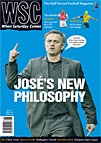 The sudden departure of the best-known vice chairman in football is likely to prove a case of ‘au revoir’ rather than goodbye. Jon Spurling looks at the long-term fault lines that have broken open and considers what a David Dein comeback on the coat-tails of Stanley Kroenke would mean for Arsenal
The sudden departure of the best-known vice chairman in football is likely to prove a case of ‘au revoir’ rather than goodbye. Jon Spurling looks at the long-term fault lines that have broken open and considers what a David Dein comeback on the coat-tails of Stanley Kroenke would mean for Arsenal
“It’s dead money,” claimed Arsenal chairman Peter Hill-Wood, after sugar importer David Dein invested £290,250 in the club in 1983. The Gunners’ former vice chairman, whose stake in the club is now worth an estimated £60 million, has had an occasionally strained relationship with Hill-Wood, who is also chairman of Hambros bank: opposite forces of tradition and new-right economics have effectively been running on slowly converging lines at Arsenal for a quarter of a century.
Fundamentally, the pair clashed over attitudes to money. Dein displayed a carnivorous attitude to snapping up “worthless” Arsenal shares in the 1980s, and has admitted to shouting “Get a winning team!” every morning in the shaving mirror. He contrasts markedly with the cigar-chomping patriarch Hill-Wood, who once revealed: “I have never looked at a football club as a financial asset. We used to buy shares at 30 bob each and to be honest viewed them as rather a waste of money.
Dein, who follows American sports closely, modernised Highbury throughout the Eighties and Nineties, having pilfered ideas from the United States. Hill-Wood once described the big screens, introduced “to improve the matchday entertainment”, as “dreadful things which make a terrible racket” and reckoned the introduction of mascots and all-seat stadiums “could switch off swathes of our traditional support”.
As Arsenal enjoyed success under George Graham and latterly Arsène Wenger, the occasional verbal joust between the curmudgeonly chairman and the brash executive seemed harmless enough, especially since Dein’s successful capture of Wenger in 1996 ushered in a decade of success at the club unparalleled since the 1930s. Yet mutterings about finances have never died down. The Ashburton Grove move seemed set to place Arsenal well ahead of their rivals when first mooted in 1999, but Roman Abramovich’s arrival at Chelsea has resulted in a seismic financial shift; the ground move now appears to have created more problems than solutions. Privately, Dein aired concerns that the new ground was extravagantly expensive and that a move to Wembley would enable the club to invest in players, rather than bricks and mortar.
Wenger said the club “will be in a very strong financial position in five years’ time, without needing to rely on some guy coming in with money”, and urged fans to “show faith in the younger players”. His reliance on academy products is partly borne out of necessity, as he has been forced to asset-strip the team and currently skulks around with all the testiness of a man labouring under gigantic mortgage repayments.
Dein clearly shared Wenger’s frustration, but the pair appear to differ over how best to resolve the financial doubts hanging over the club. There is a clear split over whether to take a more pragmatic long-term approach (Arsenal’s history is littered with extensive fallow periods, as Hill-Wood recently admitted) or seek a rapid injection of cash, something that could be provided by a partnership between Dein and Stan Kroenke, the American investor.
Although considered the most conservative of English clubs, Arsenal have frequently gone in for spectacular self-improvement, taking in the migration from Plumstead to Highbury, the “Bank of England” label as Arsenal spent a small fortune on players during the Depression, and then the move to the Emirates. The Old Etonians always bow to the market in the end.
Those economic forces have manifested themselves in a variety of ways lately: Arsenal’s increasingly bourgeois “consumers” voiced displeasure at the “product” on offer against Manchester City recently; wealthier clubs circle menacingly around Fábregas, Henry and Van Persie; and Wenger, whose contract expires in 2008, is being linked with a move abroad. Hill-Wood’s claim that he “doesn’t want to sell out to his [Kroenke’s] sort” and the pledge not to sell within a year may simply delay the inevitable. According to the Daily Telegraph piece, Danny Fiszman, the club’s largest shareholder with a 24 per cent stake, is poised to complete a 12-month residence in Switzerland in order that the £102m he would make from selling his stake becomes free of UK tax. Although Fiszman is officially siding with Hill-Wood and Lady Nina Bracewell Smith (who controls 15.9 per cent of shares) over their opposition to Kroenke, the feeling is that he may yet bale out. If Kroenke were able to purchase Fiszman’s shares and buy another 1,800 shares from the smaller shareholders, who between them own 15 per cent, Dein and he would possess the required percentage for a takeover bid.
Dein’s profile has been dented over the last two years, particularly after the Scolari fiasco forced him to relinquish his position on the FA board. But it’s hard to imagine that football’s ultimate social climber – he once eked out a living selling dented tins of baked beans – has walked away from Arsenal for good. In 12 months, with a little help from Kroenke, he could become the club’s next chairman and sweep away the old guard. You can almost hear the silver spoons being brandished in Arsenal’s plush boardroom.
From WSC 244 June 2007. What was happening this month